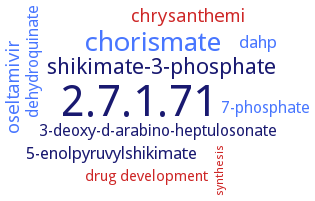2.7.1.71: shikimate kinase
This is an abbreviated version!
For detailed information about shikimate kinase, go to the full flat file.

Word Map on EC 2.7.1.71 
-
2.7.1.71
-
chorismate
-
shikimate-3-phosphate
-
chrysanthemi
-
oseltamivir
-
dahp
-
5-enolpyruvylshikimate
-
3-deoxy-d-arabino-heptulosonate
-
dehydroquinate
-
7-phosphate
-
drug development
-
synthesis
- 2.7.1.71
- chorismate
-
shikimate-3-phosphate
- chrysanthemi
- oseltamivir
- dahp
-
5-enolpyruvylshikimate
-
3-deoxy-d-arabino-heptulosonate
- dehydroquinate
- 7-phosphate
- drug development
- synthesis
Reaction
Synonyms
adenosine triphosphate: shikimate-3-phosphotransferase, AroK, AroL, AtSK1, AtSK2, kinase (phosphorylating), shikimate, kinase, shikimate (phosphorylating), MtSK, OsSK1, OsSK2, OsSK3, Rv2539c, shikimate kinase II, shikimate kinase-like 1, SK I, SK II, SK1, SK2, SKI, SKII, SKL1, type I shikimate kinase, aroK-encoded, type II shikimate kinase
ECTree
Advanced search results
Renatured
Renatured on EC 2.7.1.71 - shikimate kinase
Please wait a moment until all data is loaded. This message will disappear when all data is loaded.
the enzyme is fully unfolded in 4 M urea. Approximately 95% of the enzyme activity can be recovered on dilution of the urea from 4 to 0.36 M. Refolding occurs in at least four kinetic phases, the slowest of which corresponds with the regain of shikimate binding and enzyme activity
-
when the enzyme is unfolded by incubation in 4 M urea, addition of NaCl or Na2SO4 leads to relatively slow refolding of the enzyme. The refolded enzyme can bind shikimate, though more weakly than the native enzyme. The refolded enzyme does not appear to be capable of binding nucleotides, nor does it possess detectable catalytic activity. The refolding process brought about by addition of salt in the presence of 4 M urea is not associated with any change in the fluorescence of the probe 8-anilino-1-naphthalenesulfonic acid
-


 results (
results ( results (
results ( top
top





